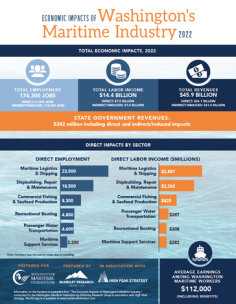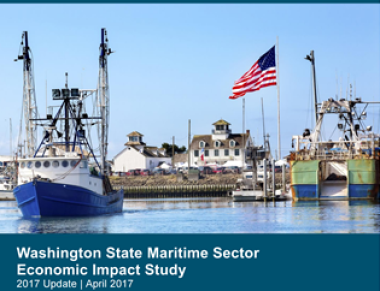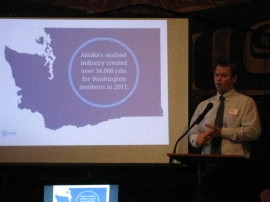
Maritime remains crucial to Washington’s economy
The Washington Maritime Federation 2022 Economic Impact Study highlighted the industry’s substantial impact on the state’s economy.
The report emphasizes a diverse workforce, innovation, and sustainability as the industry’s driving forces. From Puget Sound to river ports, maritime plays a crucial role in the state’s commerce, with educational programs addressing workforce needs. The study underscores the industry’s commitment to environmental responsibility and its readiness to tackle future challenges.
Key findings:
1. Significant Economic Impact - The region’s maritime industry cluster makes a significant contribution to our regional and global economies. Did you know Washington State Maritime is responsible for more than 174,300 direct and indirect jobs?
2. Quality Jobs and Careers - The industry offers well-paying family wage jobs and diverse career opportunities. Did you know the average annual salary with benefits for maritime industry employees, is $112,000 - $40,000 more than the average wage in Washington?
3. Excellent Products and Services: The maritime cluster delivers excellent products and services with the highest level of customer service. Did you know that there are more than 2,000 maritime businesses in Washington?
The Ballard Locks are busiest in the nation!
A century of service, but the future???
The Ballard Locks serve more individual vessels than any other locks in the nation: more than 40,000 transits in 2015, and more commercial vessels than all but 12 of the 200+ other USACE locks.
That’s just one of the key findings of the Economic Impacts of the Hiram M. Chittenden Locks analysis published in June 2017. The study was funded by a unique and diverse funding group, the Lake Washington Ship Canal Users Group.
This year marks the 100th anniversary of the Locks’ opening day in 1917, and as the Locks reach this important milestone, there is growing concern about making the critical infrastructure upgrades needed for the Locks to continue operating reliably and safely. This report discusses the benefits of reliable Locks operation, the potential losses in the event of a closure, and describes some of the steps needed to mitigate these risks.
To read the results of the Study, which was conducted by the McDowell Group, click here.
The Washington Maritime Federation released the Washington State Maritime Sector Economic Impact Study 2017 Update. This study updates the seminal 2013 study of the same name and provides a detailed analysis of the positive economic impact of the state’s maritime industry.
The study finds the maritime sector directly supported 69,500 jobs, nearly $4.7 billion in wages, and $17.1 billion in business revenue in 2015. The average wage for a maritime worker was $67,000 in 2015 compared to the statewide average of $56,700, a significant increase over the 2013 study. For every direct job in maritime, an additional 1.8 jobs are supported through secondary impacts. When these indirect and induced impacts are factored in, the sector provided 191,000 jobs and $37.8 billion in revenue statewide.
“This study builds upon past efforts and clearly shows the maritime industry is a cornerstone of the State’s economy, providing family wage jobs and real opportunities for the next generation of maritime workers. We’ve seen consistent growth across all subsectors of the industry since the 2013 study release and we feel confident about the continued growth of maritime in the years to come,” said Washington Maritime Federation Director Mark Gleason.
Maritime remains crucial to Washington’s economy
Jon Talton, The Seattle Times
Download the 2017 Washington State Maritime Sector Economic Impact Study here.
Download the 2017 Washington State Maritime Sector Economic Impact Study Infographic here.
“Ties that Bind” is report by the McDowell Group that documents the dynamic and diverse economic relationship that grows stronger each year between Alaska and Puget Sound.
Just as Alaska is economically dependent on Puget Sound as a service, supply, and transportation hub, Puget Sound derives billions of dollars in economic benefits from its powerful connections with Alaska. Those connections include the movement of millions of tons of freight and millions of passengers between Alaska and Puget Sound. Puget Sound provides essential support to Alaska’s seafood industry and other maritime sectors, as well as a critical market for Alaska’s crude oil. Important links in health care, education, and other sectors are all part of the fabric that connects Puget Sound and Alaska.
Heather Haugland, McDowell Group Senior Project Manager, presented the report to the Seattle Propeller Club. Below you can download the presentation which highlights key report findings.
Adobe Acrobat document [4.3 MB]
Adobe Acrobat document [1.4 MB]
Alaska Seafood Industry has Significant Impact on Washington's Economy
More than 50 fishing industry leaders attended a breakfast at Ivar's Salmon House on August 28th to help launch the release of the Alaska Seafood Marketing Institute's (ASMI) report on the economic value of Alaska's seafood industry.
Andy Wink of the Alaska-based research firm the McDowell Group presented data from the report, the first of its kind, showing the economic importance of the Alaska seafood industry on the rest of the country, specifically the Pacific Northwest.
The North Seattle Industrial Association, King County Maritime, Port of Seattle, Pacific Marine Expo, ASMI and Ivar's hosted the breakfast.
The complete study is here:
http://pressroom.alaskaseafood.org/wp-content/uploads/2013/08/AK-Seafood-Impact-Report.pdf







